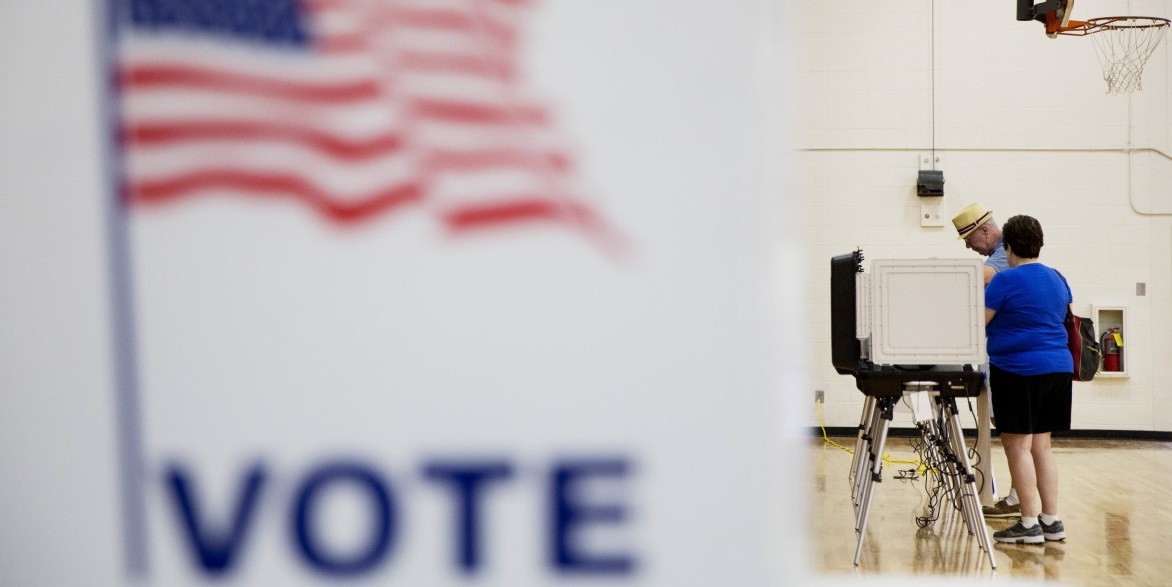Why Wordy Ballot Language May Leave Ga. Voters Puzzled

Ballot language can be confusing.
Too confusing, alleged lawyers Tuesday, who filed a class-action lawsuit against the state of Georgia. The lawyers alleged that ballot language describing a proposed constitutional amendment is misleading. That amendment, commonly known as the Opportunity School Districts Amendment, or Amendment One, would give the state more control over public schools.
But is the ballot language really that confusing, and if so, why?
To answer the first question, here’s a brief survey of reactions by Piedmont Park visitors on a recent morning, when presented with the ballot language for Amendment One.
First, the language.
“Shall the Constitution of Georgia be amended to allow the state to intervene in chronically failing public schools in order to improve student performance?”
Is this language confusing? To a person, the answer was “Yes.”
Many people expressed puzzlement over the actual words chosen: Words like “shall.” “Nobody talks like that!” said one person. Another took issue with “the state.” Did that mean the governor or someone else? And “intervene.” What exactly was meant by that?
Constitutional Language And Clear Language
This experience of re-reading something you’re supposed to vote on for a second, third or fourth time drives Ginny Redish nuts.
Redish is an expert on plain language, clear writing and the usability of all types of documents and products. She conducted a 2009 study on ballot language in which participants voted using two different ballots: one using traditional ballot legalese and one using short sentences and small words.
“It said, ‘Should this jurisdiction retain So-and-So as the judge?’ We changed [‘retain’] to the word ‘keep,’ and that was much easier for people,” Redish said.
Participants also preferred “for or against” to “accept or reject.” All in all, people preferred the clear language versions, and they performed better using them.
But Redish’s study didn’t exactly signal a sea change in the way ballot language is written across the country. In one recent week, accusations of misleading ballot language popped up in Pennsylvania, Texas, Missouri and Nevada.
A Political Issue
Constitutional lawyer Gerry Weber says ballot language is confusing for a reason.
“Oh, I think it’s very much about partisan politics,” Weber said.
To be clear, Weber is a partisan himself. He’s the lawyer who just filed a class-action lawsuit calling the ballot language for Amendment One misleading.
In Georgia, ballot language is written by legislators and a group called The Constitutional Amendments Publication Board. That’s Gov. Nathan Deal, Lt. Gov. Casey Cagle and Speaker of the House David Ralston.
“The Legislature wants an amendment to pass or fail,” Weber said, “and the way they can do that is by having language that sort of coaches the voter to a ‘yes’ or a ‘no’ vote.”
In this case, the governor and lawmakers who wrote Amendment One want it to pass, because they think the state would do a better job of turning around failing schools. But they’re the same people who wrote the ballot language – and that’s what Weber and other critics find problematic.
For its part, the governor’s office calls that ballot language “fair and accurate.”
The Full Amendment
State law requires that ballot language consist of a “brief form” of the full constitutional amendment. After all, who has time to read the whole thing?
Well, public radio does. Here, in full, is the constitutional amendment Georgians will be voting on in November, known as Amendment One:
“[T]he General Assembly may provide by general law for the creation of an Opportunity School District and authorize the state to assume the supervision, management, and operation of public elementary and secondary schools which have been determined to be failing through any governance model allowed by law. Such authorization shall include the power to receive, control, and expend state, federal, and local funds appropriated for schools under the current or prior supervision, management, or operation of the Opportunity School District, all in the manner provided by and in accordance with general law.”
The full amendment provides details that the ballot language does not … but try parsing it in a voting booth without holding up the line.
How would this look in plain language? For that, here’s WABE education reporter Martha Dalton, who described Amendment One in a recent story this way:
“The governor’s plan would create a state-run school system, or ‘Opportunity School District,’ to manage schools that have consistently failed to meet state standards. Schools that scored an F on the state’s report card for three consecutive years would qualify. School performance would be measured by things like test results and graduation rates.”
Jeremy, a jogger at Piedmont Park who did not give his last name, preferred Dalton’s plain language version of Amendment One to the language currently slated for the ballot.
“Because it gets specific. The other one is just kind of like the older language and just some big words, and you don’t really understand it,” he said.
In late August, the Constitutional Amendments Publication Board added a preamble to accompany the ballot language voters will see in November. It reads, “Provides greater flexibility and state accountability to fix failing schools through increasing community involvement.”
Critics, including the Georgia PTA, called it misleading, too.
9(MDAxODM0MDY4MDEyMTY4NDA3MzI3YjkzMw004))








